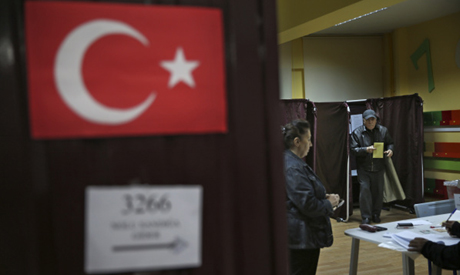
A Turkish man leaves a ballot booth, right, at a polling station where Turkey's President Recep Tayyip Erdogan will vote later in the day, in Istanbul, Sunday, Nov. 1, 2015 (Photo: AP)
Leaning against an armoured truck, masked Turkish policemen with rifles slung over their shoulders scan the crowds queuing to vote in a neighbourhood of the main Kurdish city of Diyarbakir.
Security is high in the Kurdish majority southeast for Sunday's vote following a new flare-up in the conflict between Kurdish rebels and the Turkish state and a wave of jihadist attacks which have left several hundred people dead since July.
The wall surrounding Suleyman Nazif school in Diyarbakir's Sur district, which has been turned into a polling station for the vote, is pockmarked with bullet holes.
But that did not stop people from lining up as soon as polls opened at 0400 GMT for Turkey's second parliamentary election in five months.
"All I want is peace and brotherhood, we have suffered too much lately," 43-year-old voter Mahmut Kiziltoprak told AFP.
The Sur neighbourhood, a stronghold of young Kurdistan Workers' Party (PKK) supporters, bears numerous scars of warfare: a charred building here, shattered windows and hastily-dug trenches there.
Since the breakdown of a 2013 ceasefire between the Turkish army and the outlawed PKK in August, the Kurdish southeast has been caught in the grip of a spiral of violence.
"The police entered every house in the neighbourhood, treated everyone as a criminal," said Huseyin Oturmak, 65, an observer for the pro-Kurdish People's Democratic Party (HDP).
"The AKP has no hope here," he said.
Many residents of Diyarbakir accuse Turkey's strongman President Recep Tayyip Erdogan of reigniting the flames of war after a wave of deadly tit-for-tat violence.
Ironically it was under Erdogan's watch as prime minister that Ankara introduced a raft of reforms for the Kurdish minority, estimated to number between 15 and 20 million, and launched secret negotiations with jailed PKK leader Abdullah Ocalan.
Kurds at one stage were a bedrock of support for the AKP, but voters turned to the HDP in large numbers in June, delivering it a stunning election success to become the first pro-Kurdish party to sit in parliament.
The delicate peace process has now been shattered and with it hopes of ending a war in the southeast that has claimed 45,000 lives over three decades.
The PKK conflict resumed after a bombing on pro-Kurdish activists in the border town of Suruc in July that killed 34 people and was blamed on the Islamic State group.
PKK fighters killed two Turkish policemen in revenge, with many Kurds accusing Ankara of complicity with IS, and two days later Turkish jets bombed both jihadist targets in Syria and PKK rebels in Iraq.
Both sides declared the peace process over, with Erdogan vowing to fight the PKK to the "last terrorist".
Tensions surged further in October when suicide bombers blew themselves up at a pro-Kurdish peace rally in Ankara, killing 102 people, many of them HDP members, in the worst such attack on Turkish soil.
"It's only (HDP leader) Selahattin Demirtas who can bring peace. He's the one who wants peace, therefore it's him I'm voting for," said Esat Akir, 55.
Around 11,000 police and soldiers were mobilised to ensure security in Diyarbakir and the surrounding region, according to the private NTV television channel.
And no incidents of violence were reported by mid-afternoon.
Election officials at polling stations visited by AFP predicted a high turnout: "80 to 90 percent," said Arin Zunrun Karakoyun at the Suleyman Nazif school.
"In the current climate people have realised the importance of this election," she said.
"Look at the ballot box, it is not yet 11 am and it's almost overflowing," added Hamit Bodakci at another polling stating in Sur.
"About 60 percent of the 389 registered here have already voted."
Short link: